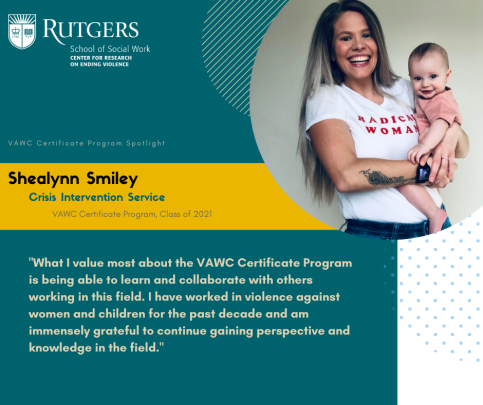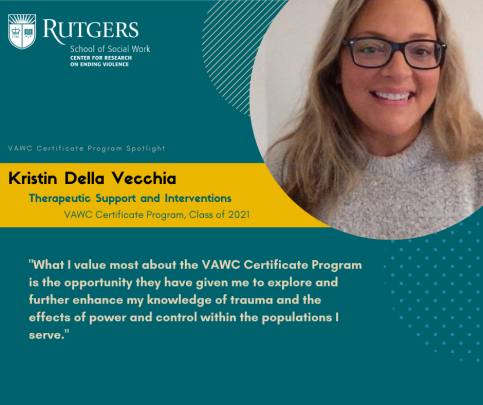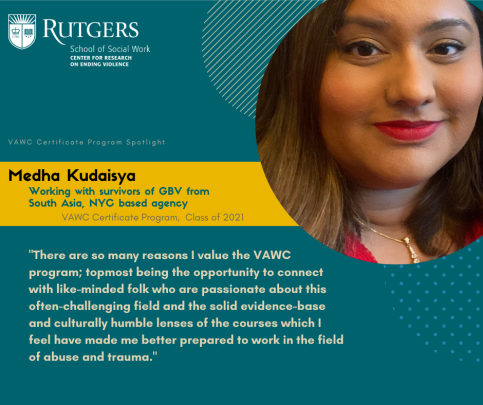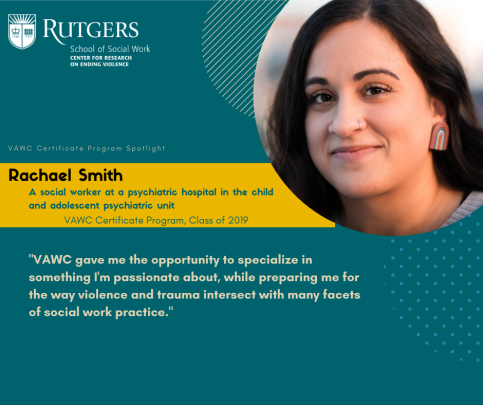Certificate on Interpersonal Violence and Trauma (C-IVT)
About the Certificate
Through the Center for Research on Ending Violence (REV), Rutgers School of Social Work offers a certificate program for Master of Social Work (MSW) students. The certificate program offers students the opportunity to specialize their advanced year studies on issues of interpersonal violence and trauma in order to provide trauma informed culturally responsive social work practice effectively. REV also provides competitive scholarships to students interested in working in the area of interpersonal violence and trauma. Students accepted for the certificate program will receive notation of completion of the certificate program on their transcripts, as well as a physical certificate.
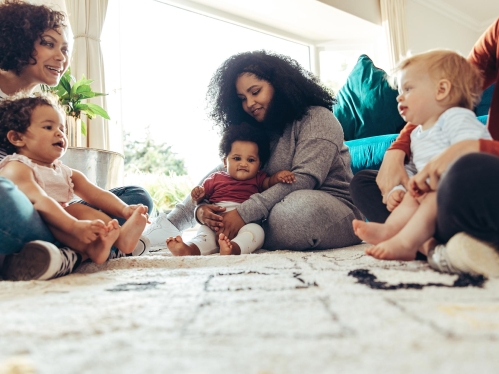
-
All advanced MSW graduate students can apply. Accepted students enroll in focused coursework within the MSW curriculum and are placed for a practicum in an agency of the student's choice that specializes in interpersonal violence and trauma, either in direct practice, management and policy or research roles.
-
- Must be at a C-IVT related placement that focuses on key areas related to interpersonal violence, including prevention, direct practice, non-profit management, and policy.
- Placement will be arranged in conjunction with the field office and the C-IVT Program.
-
- Avanzar
- Catholic Charities; Providence House, Ocean
- Ocean Mental Health Service, Toms River
- Care Plus, Bergen County
- Bergen Family Center
- Legal Services of NJ
- Princeton Behavioral Health
- Renfrew Center
- SAFE in Hunterdon
- P.E.I Kids
- Manavi
Newark
- Morris Family Justice Center
- Jersey Battered Women's Service
- Alternatives to Domestic Violence
- Sanar Wellness Institute• Wynona's House Child Advocacy Center
- Trauma Consulting, Clinical and Training Services
- Project SARAH, Jewish Family Services
- Jewish Family Service of Metrowest
- YWCA of Union County
- Family Services League
- Trinitas Regional Medical Center
Camden
- Violence Prevention and Victims Assistance (VPVA)
- Center for Discovery
- The Renfrew Center
- Monte Nido
- Princeton Center for Eating Disorders
To Apply
Students in the Traditional (on campus) (2-year, 3-year, 4-year, or advanced standing), Blended, or Online MSW program may apply to C-IVT.
Please consult the chart at the bottom of the certificates webpage for application deadlines and the link to the application.
Note that C-IVT will not accept applications past the Priority Deadline on the chart.
If you have any questions or would like additional information, please contact interim director Simone Snyder at sms694@ssw.rutgers.edu or revcenter@ssw.rutgers.edu.

C-IVT admission and general policies
Requirements
-
- Advanced Contemporary Policy: Interpersonal Violence
- Understanding Violence & Abuse in Adulthood OR and Understanding Violence & Abuse in Childhood
- Two electives approved as C-IVT approved electives (Click here for a list of C-IVT required courses and electives)
- Required field hours in a C-IVT approved field agency
- Attend one Inter-professional Seminar
-
Winter 2025 Study Abroad Program: Social Welfare, Healthcare Delivery, and Community Engagement in Sonagachi, Kolkata, West Bengal, India. C-IVT students can apply now to participate in the January 2025 Study Abroad Program, which may count as a C-IVT elective. Click here for more information and to apply. Applications are due October 1, 2024.
Through the Center for Research on Ending Violence (REV), the Rutgers School of Social Work is pleased to offer three Verizon Wireless HopeLine Scholarships annually. These scholarships aim to prepare social work professionals to work in the field of interpersonal violence and trauma nationwide. Students committed to working on these issues are eligible to apply for this $2,000 scholarship to support their graduate work. Individual selected to receive the scholarships are also provided with the opportunity to work at the Center for Research on Ending Violence as a research assistant.
Requirements
-
Students selected as C-IVT Verizon Wireless HopeLine Scholars must complete the coursework and practicum requirements of the Certificate Program, as well as present an area of research at the C-IVT End of Year Celebration.

